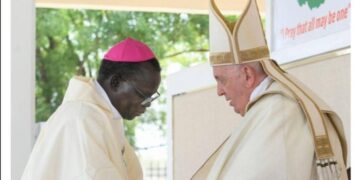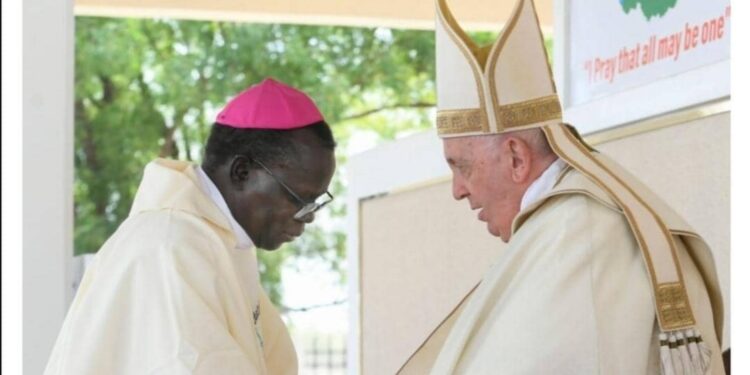By Enyichukwu Enemanna
Pope Francis has announced the elevation of 21 clergy from different parts of the world to the rank of Cardinal, giving Africa three slots with representations from South Sudan, Tanzania and South Africa.
With the promotion of the archbishop of Juba, Stephen Ameyu Martin Mulla, this is the first time South Sudan is getting the revered position of a Cardinal in the Catholic Church.
“The College of Cardinals is called to resemble a symphony orchestra, representing the harmony and synodality of the Church,” said Francis on Saturday, seated under a canopy before the gathered cardinals on the steps of St. Peter’s Basilica.
“Diversity is necessary; it is indispensable. However, each sound must contribute to the common design,” the Argentine Jesuit added.
The ceremony was witnessed by a crowd that filled half of Vatican City’s grandiose, colonnaded St. Peter’s Square known as a consistory, is the ninth since Francis was named head of the world’s 1.3 billion Catholics in 2013.
Diplomats, close advisers and administrators were equally among those ordained as new cardinals.
Cardinal Stephen Ameyu Martin Mulla, was born on 10 January 1964 and hails from Torit County of Eastern Equatoria of South Sudan.
He received priestly ordination on 21 April 1991 as a diocesan priest of the Catholic diocese of Torit.
After his pastoral work in Khartoum, he pursued a doctorate at the Pontifical Urban University from 1993 to 1997, for award of doctorate in dogmatic theology.
The title of his thesis was Toward Religious Dialogue and Reconciliation in Sudan.
He then taught at the seminary of Juba, South Sudan, eventually becoming its rector.
Pope Francis appointed Stephen Ameyu Martin Mulla, Bishop of Catholic Diocese of Torit on 3 January, 2019. The diocese had fallen vacant for 5 years since March 2013, following the death of Bishop, Johnson Akio Mutek.
On 12 December, 2019, Pope Francis appointed Stephen Ameyu Martin Mulla, as archbishop of Juba and 22nd March, 2020, marked his installation.
The world’s youngest country, South Sudan gained its independence in July 2011, after a lengthy war with neighboring Sudan.
However, conflict erupted in South Sudan just two years later, in December 2013, between different factions of the government, who were divided along tribal lines, throwing the new country into its own, internal full-on war.
An attempted ceasefire in 2014 failed to stop the fighting, and likewise, a 2015 “Compromise Peace Agreement” also fell through and fighting continued.



































